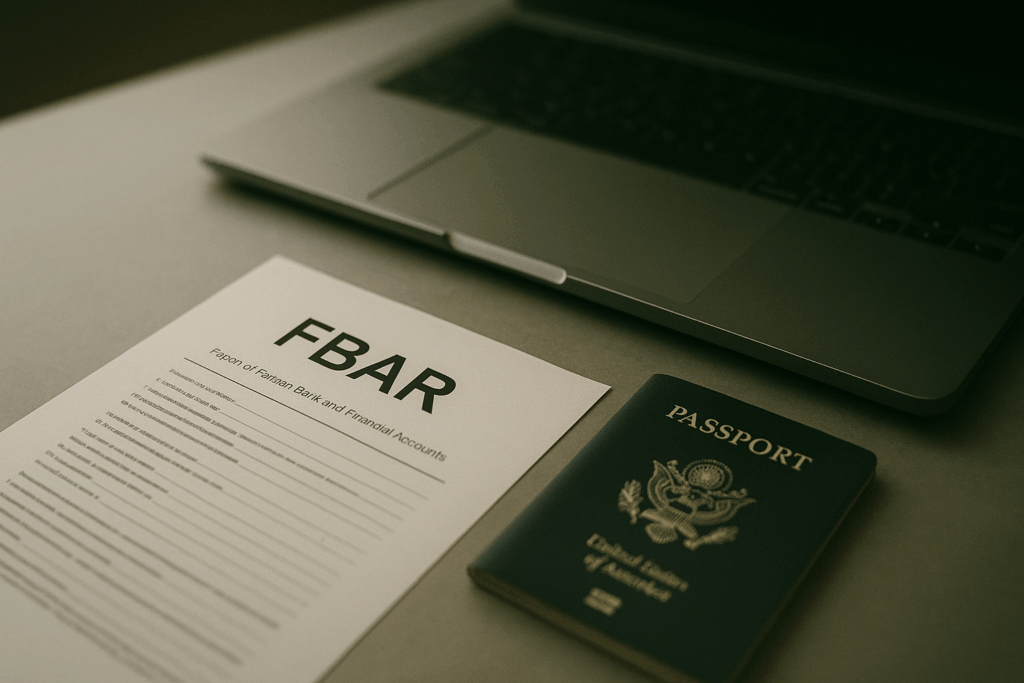FBAR Requirements 2025: Avoid Penalties Up to $129,210 Per Account
Missing FBAR deadlines costs Americans millions in preventable penalties each year. Use our qualification calculator to determine your exact filing requirements and avoid costly compliance mistakes with our step-by-step guide.
Complete FBAR Compliance Guide with Interactive Calculator
Key Takeaways
- FBAR filing required if foreign accounts exceeded $10,000 at any point in 2024
- Penalties start at $12,921 per account for willful non-compliance, up to $129,210 maximum
- June 30, 2025 deadline with automatic 6-month extension for electronic filing
- Use our calculator below to determine exact filing requirements for your situation

This is a professional-grade optimization framework. Always consult a qualified advisor before implementation.
The FBAR Trap That Catches Successful Americans
Sarah, a successful e-commerce entrepreneur, received a letter that changed everything. The IRS was assessing a $38,763 penalty for failing to file a single FBAR form. Her crime? A forgotten business account in the UK that held $15,000 for exactly three months in 2022.
The Foreign Bank Account Report (FBAR) catches thousands of Americans off-guard every year. Unlike most tax penalties that scale with your income, FBAR penalties can exceed the actual account balance. The government doesn’t care if you “forgot” – ignorance isn’t a defense when penalties start at $12,921 per account for willful violations.
The stakes are real, but qualification is straightforward once you understand the rules.
Do You Need to File FBAR? 60-Second Assessment
Most Americans trigger FBAR requirements without realizing it. The $10,000 threshold applies to your highest combined balance on any single day – not your average balance or year-end balance.
FBAR Calculator: Get Your Exact Requirements
Don’t guess about FBAR compliance. Use our calculator to determine your exact filing requirements based on your specific situation. Fill out below and get an instant assessment.
The calculator above analyzes your foreign account activity and provides specific guidance for your 2024 tax year. Results include filing deadlines, penalty risks, and next steps for compliance.
Common FBAR Scenarios That Surprise Americans
Business Owners with Foreign Entities
Your LLC’s foreign bank account counts toward FBAR thresholds, even if you rarely access it. Many entrepreneurs establish foreign entities for tax optimization but forget about ongoing FBAR obligations.
Crypto Holders on Foreign Exchanges
Binance, Kraken International, and other offshore crypto platforms trigger FBAR requirements. Your Bitcoin holdings count at their USD value on the day of highest balance.
Expats with Local Banking Relationships
Living abroad doesn’t exempt you from FBAR. Your everyday checking account in Singapore, Portugal, or Dubai likely triggers filing requirements if it exceeds the threshold.
Retirees with Overseas Investments
Foreign mutual funds, pension accounts, and investment platforms all count toward FBAR calculations. Many retirees unknowingly violate requirements through seemingly innocent overseas investments.
Joint Account Holders
If you’re listed on a foreign account – even one you don’t actively use – you may have FBAR obligations. This catches spouses and business partners frequently.
FBAR Penalties and Deadlines You Must Know
Penalty Structure:
- Non-willful violations: Up to $12,921 per account
- Willful violations: Greater of $129,210 or 50% of account balance
- No statute of limitations for willful violations
Critical Dates:
- Filing deadline: June 30, 2025 (no extensions for paper filing)
- Electronic filing: Automatic 6-month extension to October 15, 2025 (Source: IRS FBAR Reference Guide & FinCEN filing instructions)
- Lookback period: All accounts held during calendar year 2024
Important: FBAR penalties are separate from income tax penalties. You can face both simultaneously for the same unreported foreign accounts.
The IRS has significantly increased FBAR enforcement since 2018. Automated systems now cross-reference foreign account data from multiple sources, making “accidental” non-compliance increasingly difficult to defend.
Filing Resources and Record-Keeping
Official Filing: Complete your FBAR using FinCEN Form 114 through the BSA E-Filing System.
Required Records: Maintain account statements showing highest balances, bank contact information, and account opening/closing dates for at least five years.
Ongoing Compliance: FBAR requirements continue each year you maintain foreign accounts above thresholds. Stay updated on regulatory changes through our tax optimization strategies hub.
Remember: FBAR compliance is straightforward when you understand the rules, but penalties for non-compliance can be financially devastating. When in doubt, file – there’s no penalty for unnecessary FBAR submissions.
Global Strategy Framework
This content provides framework-level insights for sophisticated investors and financial professionals. While comprehensive, it requires proper professional guidance for implementation in your specific situation. All strategies must be executed in full compliance with relevant laws and regulations.
This material is for informational purposes only and does not constitute investment, legal, or tax advice. Consult qualified professionals for guidance specific to your circumstances.